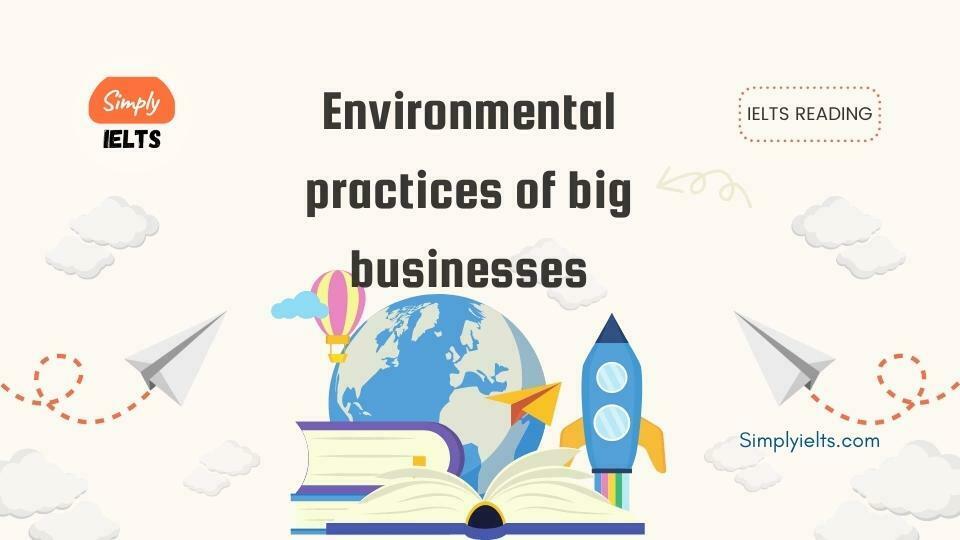Environmental practices of big businesses IELTS reading answers and explanation
A new IELTS Reading Academic passage 3 from Cambridge IELTS 15 Reading test 4 Environmental practices of big businesses IELTS reading test with answers and explanation
In this IELTS Reading exam, you will find Environmental practices of big businesses IELTS reading test with answer keys and explanation

In the Answers tab, you can find Environmental practices of big businesses IELTS reading answers with location and explanation
Related articles:
- Why we need to protect polar bears Reading answers
- Stadiums: past, present and future IELTS Reading with answers
- Describe a cafe you like to visit IELTS Cue Card
- A step by step guide to IELTS Speaking Part 2 or cue card
Environmental practices of big businesses
The environmental practices of big businesses are shaped by a fundamental fact that for many of us offend our sense of justice. Depending on the circumstances, a business may maximize the amount of money it makes, at least in the short term, by damaging the environment and hurting people. That is still the case today for fishermen in an unmanaged fishery without quotas, and for international logging companies with short-term leases on tropical rainforest land in places with corrupt officials and unsophisticated landowners. When government regulation is effective, and when the public is environmentally aware, environmentally clean big businesses may out-compete dirty ones, but the reverse is likely to be true if government regulation is ineffective and if the public doesn’t care.
It is easy for the rest of us to blame a business for helping itself by hurting other people. But blaming alone is unlikely to produce change. It ignores the fact that businesses are not charities but profit-making companies, and that publicly owned companies with shareholders are under obligation to those shareholders to maximize profits, provided that they do so by legal means. US laws make a company’s directors legally liable for something termed ‘breach of fiduciary responsibility’ if they knowingly manage a company in a way that reduces profits. The car manufacturer Henry Ford was in fact successfully sued by shareholders in 1919 for raising the minimum wage of his workers to $5 per day: the courts declared that, while Ford’s humanitarian sentiments about his employees were nice, his business existed to make profits for its stockholders.
Our blaming of businesses also ignores the ultimate responsibility of the public for creating the condition that let a business profit through destructive environmental policies. In the long run, it is the public, either directly or through its politicians, that has the power to make such destructive policies unprofitable and illegal, and to make sustainable environmental policies profitable.
The public can do that by suing businesses for harming them, as happened after the Exxon Valdez disaster, in which over 40,000m3 of oil were spilled off the coast of Alaska. The public may also make their opinion felt by preferring to buy sustainably harvested products; by making employees of companies with poor track records feel ashamed of their company and complain to their own management; by preferring their governments to award valuable contracts to businesses with a good environmental track record; and by pressing their governments to pass and enforce laws and regulations requiring good environmental practices.
In turn, big businesses can expert powerful pressure on any suppliers that might ignore public or government pressure. For instance, after the US public became concerned about the spread of a disease known as BSE, which was transmitted to humans through infected meat, the US government’s Food and Drug Administration introduced rules demanding that the meat industry abandon practices associated with the risk of the disease spreading. But for five years the meat packers refused to follow these, claiming that they would be too expensive to obey. However, when a major fast-food company then made the same demands after customer purchases of its hamburgers plummeted, the meat industry complied within weeks. The public’s task is therefore to identify which links in the supply chain are sensitive to public pressure: for instance, fast-food chains or jewelry stores, but not meat packers or gold miners.
Some readers may be disappointed or outraged that I place the ultimate responsibility for business practices harming the public on the public itself. I also believe that the public must accept the necessity for higher prices for products to cover the added costs, if any, of sound environmental practices. My views may seem to ignore the belief that businesses should act in accordance with moral principles even if this leads to a reduction in their profits. But I think we have to recognize that, throughout human history, in all politically complex human societies, government regulation has arisen precisely because it was found that not only did moral principles need to be made explicit, they also needed to be enforced.
To me, the conclusion that the public has the ultimate responsibility for the behavior of even the biggest businesses is empowering and hopeful, rather than disappointing. My conclusion is not a moralistic one about who is right or wrong, admirable or selfish, a good guy or a bad guy. In the past, businesses have changed when the public came to expect and require different behavior, to reward businesses for behavior that the public wanted, and to make things difficult for businesses practicing behaviors that the public didn’t want. I predict that in the future, just as in the past, changes in public attitudes will be essential for changes in businesses’ environmental practices.
Now start to answer “Environmental practices of big businesses questions pdf IELTS reading test” questions. You will have 20 minutes to answer questions 27 to 40.
.You can download the test and answers as a pdf file from here:
Environmental practices of big businesses IELTS reading test Questions
click Finish exam to check the correct answers
Environmental practices of big businesses IELTS Reading Answers
| Questions | Answers |
|---|---|
| 27 | D |
| 28 | E |
| 29 | F |
| 30 | H |
| 31 | B |
| 32 | C |
| 33 | D |
| 34 | B |
| 35 | YES |
| 36 | NOT GIVEN |
| 37 | NO |
| 38 | YES |
| 39 | NOT GIVEN |
| 40 | D |



Responses